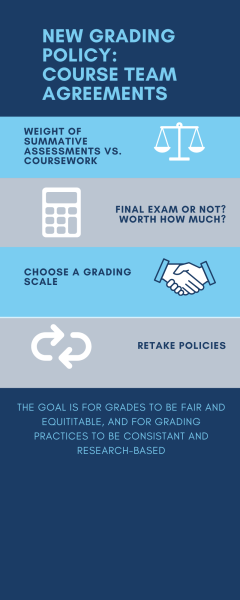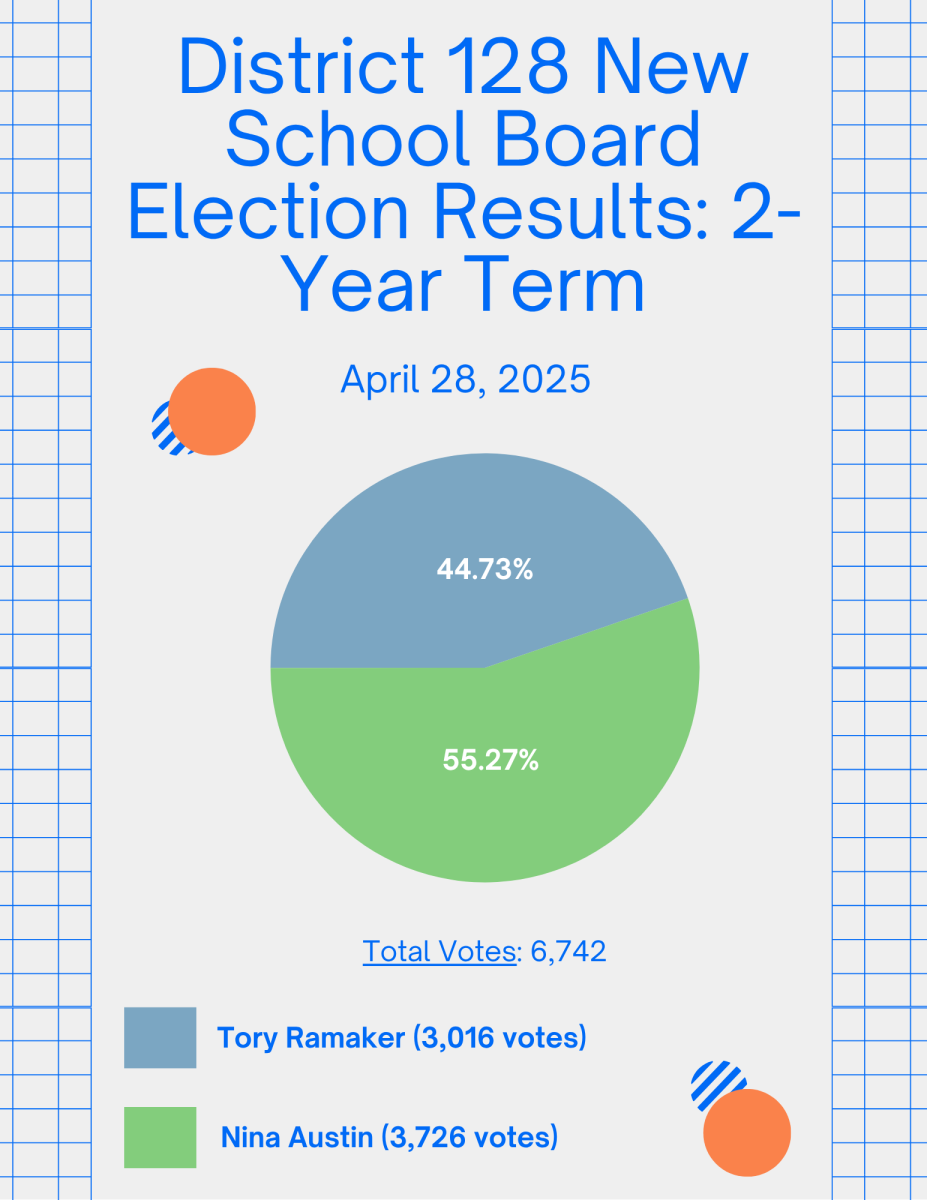Starting the 2024-25 academic year, D128 will implement new grading practices that will go into effect school-wide. This change will take the district’s very broad policies and try to narrow parameters for grading.
For many years, students and parents have expressed concerns with D128’s grading practices.
“[Many parents] said that variety [in grading] is good,” Assistant Principal Dr. Ray Albin said. “They appreciated that, but sometimes this variety was awfully wide. They wanted to know if there was something we could do about it.”
Since each teacher has a unique teaching style, each course’s assignments and summative work differs. Even in a similar subject matter, each teacher makes individual choices to effectively teach their material.
Addressing these concerns, in the 2022-23 academic year, a committee of teachers and administrators was formed. They reviewed data from a survey given to teachers and drafted guidelines for the new policies.
In the 2023-24 academic year, 96 teachers representing 74 courses participated in a grading and assessment pilot, providing feedback on their experiences to better inform the committee. Feedback was also gathered from students and families.
Course teams made up of teachers must decide on grading and assessment practices by the end of this

school year, specifically the weight of summative and formative assessments, final exam policies, the grading scale and retake parameters.
“We wanted to make sure that any practice that we changed was in alignment with our mission, our district DARING mission and our strategic plan, which is sort of the execution of that mission,” Dr. Albin said. “Right now, formulas for grading are sort of all over the place.”
In terms of the weight of assessments, course teams must agree on a policy that places summative assessments between 80-100% of a student’s grade and formative assessments between 0-20%.
While equally important, summative and formative assessments differ. Summatives, such as tests, typically carry higher stakes and a higher grade, while formatives, such as homework, often do not affect a student’s grade as much.
In terms of final exam policies, course teams must agree on if the semester will include a final exam or other experience. If the team decides to move forward with a final, they must agree on its weight (up to 20%).
In terms of the grading scale, course teams must choose one of two options. The first is an equidistant (40, 50-100) scale to evaluate students. The second is an option yet to be determined by the district.
Dr. Albin said that using a 40% in place of a zero for no evidence of completion is beneficial for a student’s grade, as it more accurately reflects what the student knows and can do.
“You have to score way higher in your next many assignments to try to overcome that zero,” Dr. Albin said.
In terms of retake parameters, course teams must decide on the essential work that can be reassessed, the criteria students must meet to reassess, the timeline and deadline for reassessments and how the grade will be affected, such as averaging two grades or a full replacement.
According to the grading and assessment guidelines created by the committee, grading practices should be fair and equitable, research-based and more consistent for all learners.
Furthermore, it has been determined that behaviors such as class participation and effort, adherence to class rules and lateness of assigned work cannot be included in a student’s grade unless they are specifically tied to a course standard. These are considered behavioral concerns that are not measured by academic performance.
“We were very much trying to make sure that our practices were about the grade or the assessment,” Dr. Albin said, “not about any type of behavioral consequences.”
The new grading guidelines aim to bring about more consistency and narrow grading practices, while still leaving room for course team choice.
“It’s very much providing some guidance,” Dr. Albin said, “but at the same time it allows all our academic departments the latitude they need to be able to calculate a grade correctly.”




![Mr. Abullh Ali, manager/assistant, helps open Queen Yemeni Coffee in downtown Libertyville at 606 North Milwaukee Ave. With the help of employees such as manager and LHS senior Yousef Taha, they are able to bring the Yemeni and Ethiopian culture to Libertyville by using their Queen spices, cinnamon and cardamom in their drinks such as Adani Chai, which is inspired by Sheda, the Queen of Yemen and Ethiopia. “The history of our coffee [is] a long history and we believe that Yemen and Ethiopia started the coffee and we are bringing something unique to the community,” Mr. Ali said.](https://www.lhsdoi.com/wp-content/uploads/2025/04/Photo-1-1200x800.jpg)




